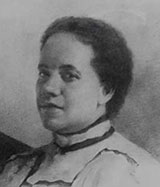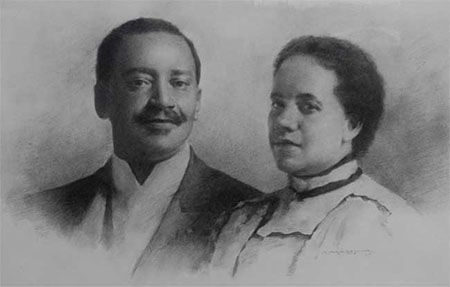Sheppard, Lucy

William H Sheppard and Lucy (Gantt) were African American Presbyterian missionaries to the Congo. Born in Waynesboro, Virginia, William Sheppard graduated from Stillman Institute, the Southern Presbyterian school for African American ministers in Tuscaloosa, Alabama. While he was serving as a pastor in Atlanta, Georgia, his call to become a missionary to Africa was confirmed by the Presbyterian Church U.S. Committee of Foreign Missions. After a white minister, Samuel M. Lapsley, also volunteered, in 1890 the two left for the Congo Free State (Zaire). In the remote Kasai region, 1,200 miles from the coast, they established the American Presbyterian Congo Mission. Lapsley died after two years, but their partnership established a pattern of racial collegiality which endured in the mission for three decades. Sheppard’s missionary goal was the conversion of both individuals and tribes. He built churches and day schools and established homes for boys and girls rescued from slavery. His early exploration and careful study of the culture of the hitherto xenophobic Bakuba tribe resulted in his being made a fellow of the Royal Geographic Society in London in June 1893. With others he gave international publicity to the cruel exploitations of King Leopold II against the Congolese people. In this connection, he was received at the White House by three presidents. In 1909 Sheppard and his colleague William M. Morrison were tried in the Congo for libel after publishing an article detailing the forced labor policies and brutal punishments used by the state rubber company in the Kasai. After their acquittal, conditions began to improve. Sheppard lectured widely for missionary and human rights causes and was often featured together with people like Booker T. Washington. Years after his death he came to be recognized for his accurate ethnographic description of African peoples and for his extensive collection of artifacts.
Lucy Gantt graduated from high school and college at Talladega, Alabama. At Talladega College she sang with the famous Jubilee Singers, a touring group that introduced Negro spirituals to the American public in the north. She became engaged to Sheppard in 1886 and taught in Birmingham city schools until they married in 1891, when he was home on furlough. Upon arriving in the Congo, Lucy Sheppard focused on educational work. For example, in 1897 she was principal in Lucbo of a school with forty-five students. She wrote the first book ever produced in the Bakuba language, a reading primer published by the mission in 1902, and she was mainly responsible for the first hymnal published in the Bakuba language. After the Sheppards returned to the United States in 1910, they organized the Grace Presbyterian Church in Louisville, Kentucky, and Lucy Sheppard served as a social worker. The Sheppards had four children, two of whom died in the Congo.
John R. Hendrick and Winifred K. Vass
Bibliography
Lucy Gantt Sheppard, From Talladega College to Africa (n.d.).
William H. Sheppard, Presbyterian Pioneers in Congo (1917).
Harold Cureau, “William H. Sheppard: Missionary to the Congo and Collector of African Art,” The Journal of Negro History, Winter 1982, p. 343.
Julia Kellersberger, Lucy Gantt Sheppard (n.d.).
William E. Phipps, The Sheppards and Lapsley: Pioneer Presbyterians in the Congo (1991).
Stanley Shaloff, Reform in Leopold’s Congo (1970).
Additional materials are located at the Department of History, Presbyterian Church (U.S.A.), Montreat, N.C., and at Hampton University archives, Hampton, Va.
Photo Gallery

This article is reproduced, with permission, from Biographical Dictionary of Christian Missions, copyright © 1998, by Gerald H. Anderson, W. B. Eerdmans Publishing Company, Grand Rapids, Michigan. All rights reserved.



